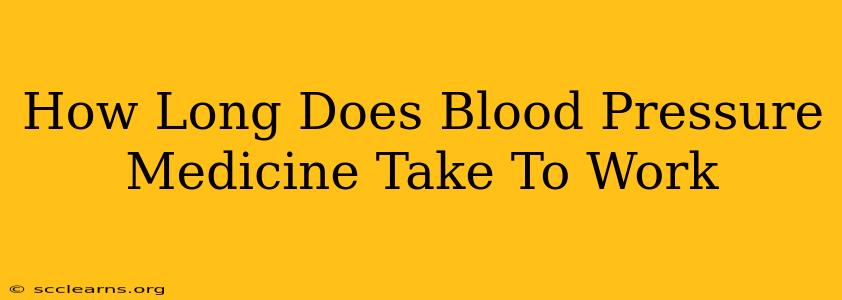High blood pressure, or hypertension, is a serious health concern affecting millions worldwide. If you've been diagnosed with hypertension, your doctor likely prescribed medication to help manage it. But a common question many patients have is: how long does blood pressure medicine take to work? The answer isn't a simple one-size-fits-all, as it depends on several factors.
Understanding Blood Pressure Medication
Before we delve into timelines, let's understand how blood pressure medication works. These medications don't instantly lower your blood pressure; instead, they work gradually to bring it down to a healthy level. The specific mechanism varies depending on the type of medication prescribed. Some common types include:
- ACE inhibitors: These block the production of a hormone that narrows blood vessels.
- Angiotensin receptor blockers (ARBs): Similar to ACE inhibitors, these block the action of the hormone.
- Beta-blockers: These slow down your heart rate and relax blood vessels.
- Calcium channel blockers: These relax blood vessels and lower heart rate.
- Diuretics: These help your body get rid of excess salt and water, reducing blood volume.
The type of medication prescribed will influence how quickly you see results.
How Soon Will I See Results?
The timeframe for noticing a reduction in blood pressure varies significantly:
Immediate Effects (Minutes to Hours):
Some medications, particularly fast-acting IV medications used in hospital settings for hypertensive crises, can produce noticeable effects within minutes to hours. However, this is not typical for the medications prescribed for long-term home management.
Short-Term Effects (Days to Weeks):
For most people taking oral medications, noticeable effects are typically seen within a few days to a few weeks. You may not feel any different, but regular blood pressure monitoring will show a gradual decrease. This initial period is crucial for your body to adjust to the medication.
Long-Term Effects (Weeks to Months):
It may take several weeks or even months to reach optimal blood pressure control. Your doctor will likely monitor your blood pressure regularly during this period and adjust your dosage as needed. Consistency is key. It's vital to take your medication as prescribed, even if you don't feel any immediate effects.
Factors Affecting the Time to Effectiveness
Several factors can influence how quickly your blood pressure medication works:
- Type of medication: As mentioned, different medications have different mechanisms and timeframes.
- Dosage: The prescribed dosage plays a significant role. Lower doses may take longer to show effects.
- Individual response: Everyone's body reacts differently to medications.
- Underlying health conditions: Other health problems can impact medication effectiveness.
- Lifestyle factors: Diet, exercise, and stress levels significantly influence blood pressure.
When to Contact Your Doctor
While gradual improvement is expected, you should contact your doctor if:
- You experience any significant side effects.
- Your blood pressure remains consistently high despite medication.
- You experience dizziness, lightheadedness, or fainting.
Important Note: This information is for general knowledge and shouldn't replace professional medical advice. Always consult your doctor or healthcare provider for personalized guidance on managing your blood pressure. They can accurately assess your specific situation and determine the appropriate course of action. Regular blood pressure checks and open communication with your doctor are essential for effective blood pressure management.

